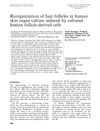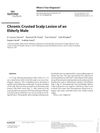7 citations,
August 2019 in “JAAD Case Reports” Hidradenitis suppurativa may be more severe in people with Mediterranean fever gene mutations.
 33 citations,
April 1990 in “Dermatologic Clinics”
33 citations,
April 1990 in “Dermatologic Clinics” Minoxidil effectively treats hair loss, with better results in women.
16 citations,
September 1990 in “Fertility and sterility” Ketoconazole can treat ovarian hyperandrogenism but should be used cautiously with monitoring and birth control.
 56 citations,
July 2005 in “Experimental Dermatology”
56 citations,
July 2005 in “Experimental Dermatology” Injected human hair follicle cells can create new, small hair follicles in skin cultures.
 13 citations,
June 1989 in “Pediatric clinics of North America/The Pediatric clinics of North America”
13 citations,
June 1989 in “Pediatric clinics of North America/The Pediatric clinics of North America” The conclusion is that young women with excessive hair growth should be quickly tested for hormonal issues and treated to improve their social well-being.
January 1989 in “Handbook of experimental pharmacology” Drugs can change hair growth and this is important because it can upset people.
 September 1988 in “Inpharma (Balgowlah)”
September 1988 in “Inpharma (Balgowlah)” Retinoids are effective for acne but can cause serious side effects.
 110 citations,
April 2002 in “The Journal of clinical endocrinology and metabolism/Journal of clinical endocrinology & metabolism”
110 citations,
April 2002 in “The Journal of clinical endocrinology and metabolism/Journal of clinical endocrinology & metabolism” Dihydrotestosterone gel improved well-being and sexual function in older men without negatively affecting prostate health.
 2 citations,
March 2016 in “InnovAiT”
2 citations,
March 2016 in “InnovAiT” PCOS is a common hormonal disorder in women, often involving menstrual issues and increased diabetes risk, managed through lifestyle changes and targeted treatments.
 117 citations,
May 2017 in “Human Reproduction Update”
117 citations,
May 2017 in “Human Reproduction Update” The update highlights that non-classic congenital adrenal hyperplasia is common in women with excess male hormones, requires specific hormone tests for diagnosis, and has various treatment options depending on age and symptoms.
 38 citations,
October 1996 in “Dermatologic Clinics”
38 citations,
October 1996 in “Dermatologic Clinics” Certain hormone treatments can improve acne and related conditions in women.
 June 2013 in “Expert Review of Dermatology”
June 2013 in “Expert Review of Dermatology” The article concludes that hormonal therapy is an effective long-term acne treatment, even for those without hormonal imbalances.
 January 2025 in “TURKDERM”
January 2025 in “TURKDERM” Alopecia areata incognito in children can be effectively treated with triamcinolone acetonide and supplements, leading to full hair regrowth.
 71 citations,
January 2004 in “Dermatology”
71 citations,
January 2004 in “Dermatology” Oral finasteride works better than topical minoxidil for hair growth, both are safe.
 1 citations,
November 2002 in “Endocrine practice”
1 citations,
November 2002 in “Endocrine practice” The patient's high testosterone was reduced by a medication that suppresses gonadotropin.
 17 citations,
January 1986 in “Acta obstetricia et gynecologica Scandinavica”
17 citations,
January 1986 in “Acta obstetricia et gynecologica Scandinavica” Spironolactone can reduce hair growth and testosterone in hirsutism, but is less effective than combined treatments.
 2 citations,
December 2017 in “Skin appendage disorders”
2 citations,
December 2017 in “Skin appendage disorders” An elderly man's non-healing scalp lesion was successfully treated with a strong topical steroid.
 9 citations,
November 2003 in “Journal of Investigative Dermatology”
9 citations,
November 2003 in “Journal of Investigative Dermatology” Low serum ferritin levels are linked to hair loss in women.
 October 2022 in “Journal of advanced research in medicine”
October 2022 in “Journal of advanced research in medicine” A woman with Sheehan syndrome improved with hormone treatment.
 January 2025 in “BMC Nephrology”
January 2025 in “BMC Nephrology” Most end-stage renal disease patients in Jordan have skin issues like dryness and itching.
4 citations,
February 2023 in “Frontiers in Oncology” Nano-Pulse Stimulation™ Therapy is more effective and less damaging than cryoablation for treating melanoma tumors in mice.
3 citations,
January 2018 in “Frontiers in bioscience” Daily subcutaneous testosterone effectively restores testosterone levels in men.
 November 2023 in “International Journal of Women's Dermatology”
November 2023 in “International Journal of Women's Dermatology” Hormone replacement therapy may improve hair growth in the frontal hairline of postmenopausal women with hair loss.

The paper suggests that a decrease in estrogen receptor activity may cause sexual dysfunction syndromes and proposes hormonal treatments.
 5 citations,
April 2021 in “Journal of Endocrinological Investigation”
5 citations,
April 2021 in “Journal of Endocrinological Investigation” Higher DHT levels are linked to fewer hypogonadism symptoms in men with normal testosterone levels.
January 2013 in “Obstetrical & gynecological survey” Most women with hirsutism have normal hormone levels and can be treated with cosmetic methods; obesity and PCOS are common causes, and treatments depend on the underlying issue.
18 citations,
August 2019 in “Clinical breast cancer” Local hormonal treatment for vulvovaginal atrophy is likely safe for women with estrogen receptor-positive breast cancer on aromatase inhibitors.
 5 citations,
January 2021 in “Biomedicine & Pharmacotherapy”
5 citations,
January 2021 in “Biomedicine & Pharmacotherapy” Policosanol helps treat hair loss by balancing hormones and supporting hair growth.
 24 citations,
December 2016 in “Psychiatric Clinics of North America”
24 citations,
December 2016 in “Psychiatric Clinics of North America” Transgender women can develop feminine traits and improve their quality of life through hormone therapy and surgery, but results vary and access to surgery can be limited.
 98 citations,
August 2004 in “BJU international”
98 citations,
August 2004 in “BJU international” Medications have become the main treatment for enlarged prostate symptoms, replacing surgery and watchful waiting.






















